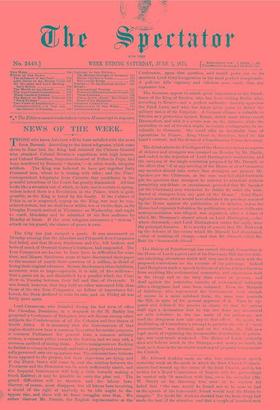Mr. Edward Jenkins made an able but extravagant speech yesterday
week on the mode in which the Irish Church Commis- sioners had wound up the estate of the Irish Church, anti in his motion for a Royal Commission of Inquiry into the proceedings he carried only 34 members with him, even his seconder (Mr. IV. Shaw) so far throwing him over as to express his belief that "the case would be found not to be near so bad as the speech of his honourable friend would lead the House to imagine." No doubt Mr. Jenkins showed that the Irish clergy had made the best—ci the situation and that a couple of hundred men who were only in preparation for holy orders at the time of Mr. Gladstone's first statement, entered and became entitled to com- pensation before the Irish Church Act came into operation. But part of the difference in favour of the Church between Mr. Glad- stone's first estimate and the result was shown to be due to amend- ments made in the House of Lords, and part was due to the fact that the annuities at first valued were valued by the Ordnance valuation of glebe lands, whereas, as subsequently calculated, a value very much above that of the Ordnance valuation was taken. On the whole, Mr. Jenkins unquestionably used language that was far beyond any evidence produced, and in uttering the word "corruption," though he admitted an alternative between the hypothesis of corruption and the hypothesis of mismanagement, as descriptive of the mode in which the Irish Church Commis- sioners,—Lord Monck, Mr. Justice Lawson, and the late Mr. G. A. Hamilton,—discharged their trust, he made a very foolish blunder, of which his opponents were not slow to avail themselves. His motion was defeated by 148 against 34 votes.



































